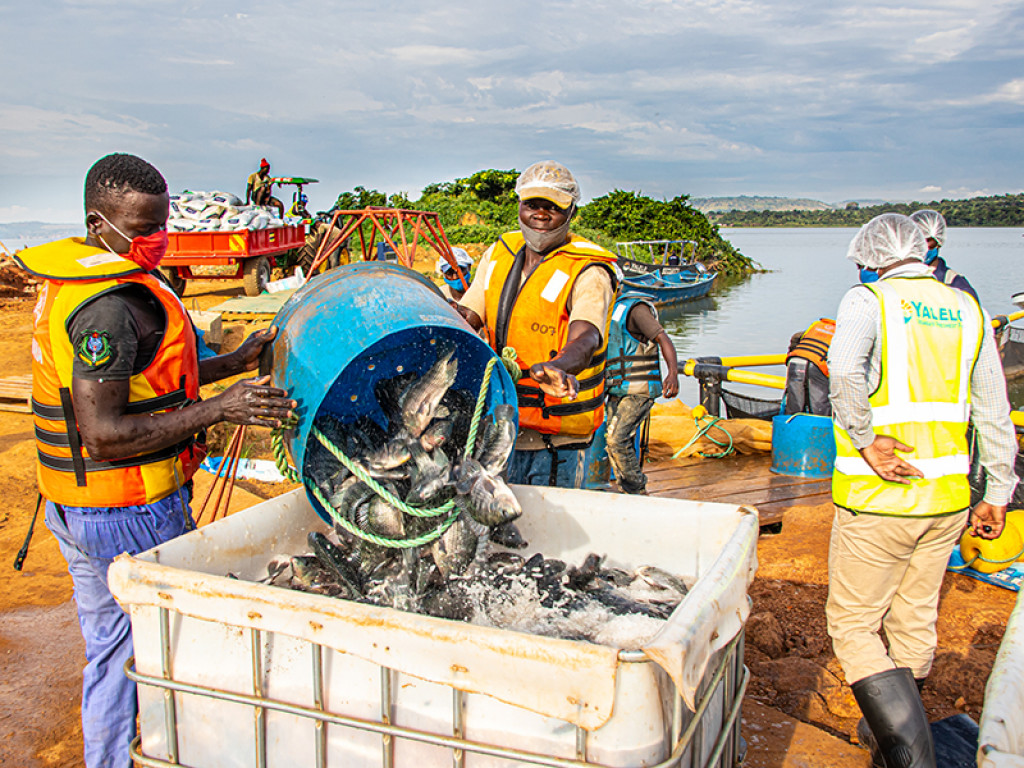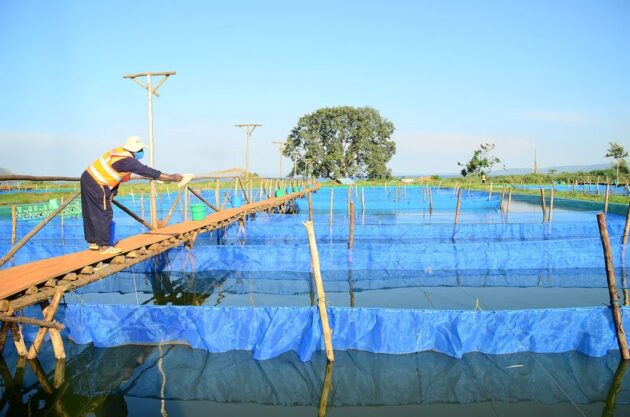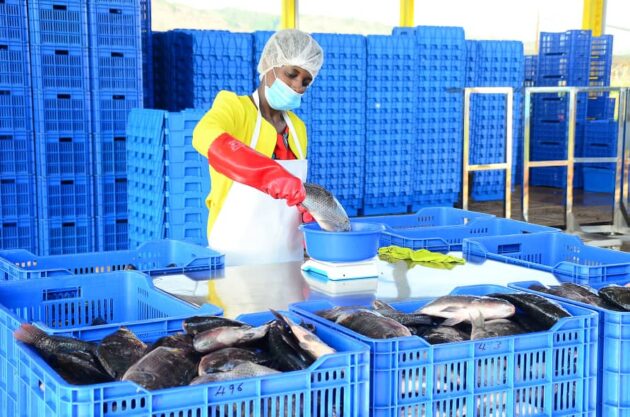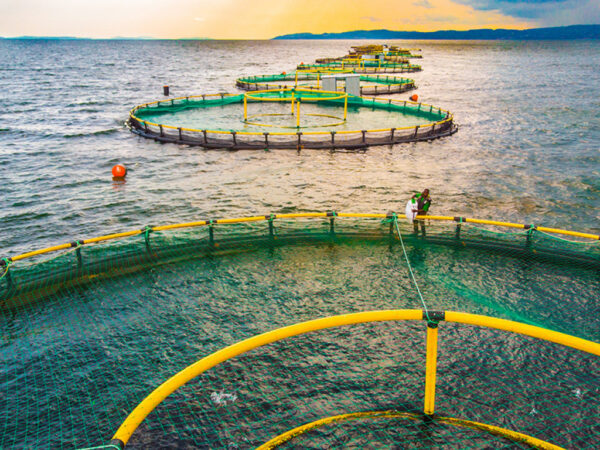
Features
Hatchery Operations
Sustainability
Champion of aquaculture in Africa
How Yalelo Uganda grew to become an aquaculture leader in its first three years of operation
March 9, 2023 By Bob Atwiine
 Workers picking fish from the nets after fishing from the cages inside lake Victoria (Photo: Yalelo Uganda)
Workers picking fish from the nets after fishing from the cages inside lake Victoria (Photo: Yalelo Uganda) Aquaculture and fisheries are the integral part of Africa’s economy.
The sector directly contributes more than US$30 billion to the African economy. The sector also provides employment to more than 12 million people (58 per cent in the fishing and 42 per cent in the processing sector). In sub Saharan Africa, it accounts for 40 per cent of the growth development product.
For Uganda’s case, over 15,000 tons of fish from aquaculture – including production from small-scale fish farmers, emerging commercial fish farmers and stocked community water reservoirs and minor lakes – are produced each year.
The aquaculture enterprise is still largely in its take-off stages in Africa, despite it being practiced even in pre-colonial times. This has been mainly due to the fish from natural water bodies like lakes, streams and rivers being sufficient for the fish eating populations. But with the increase in population and an increased demand for export, the natural stocks have dwindled to alarming levels. Meeting the domestic demand alone has become a problem without alternative sources of fish.
To realize the full potential of the sector, Yalelo Uganda, a subsidiary of First Wave Group with operations in three African countries, is stepping up its own efforts to help fill the demand gap both locally, regionally and globally.
Yalelo Uganda’s state of the-art production facility is located in Buikwe District on the shores of Lake Victoria, Africa’s largest lake by area and the world’s biggest tropical lake. From here, the company dispatches fresh products daily to its growing fleet of retail shops in Kampala and regional customers in Kenya and others in the populous Democratic Republic of the Congo (DRC).
In Uganda, the company has been operational for the past three years but in that short period of time, it has been able to put up world-class operations and the biggest aquaculture facility in the country.
These facilities range from the cages in the lake to the hatchery, as well as major structures such as, engineering department, feed warehouse, processing factory and more.
Operations
Yalelo which is loosely translated as ‘for today’ in the local dialect of Luganda, prides itself in producing Uganda’s freshest fish. Their process begins with breeding and raising their fish in hatcheries, before being transferred to cages in the fresh waters of Lake Victoria.
In the hatchery and even on the lake, Yalelo fish are fed with top quality feed which the company manufactures itself. Upon maturity, the fish is then harvested and processed following world standards and taken to retail outlets across the country, ready for consumption.

A Yalelo staff feeding fish in the cage in the lake (Photo: Yalelo Uganda)
Piers Mudd, the company CEO told Hatchery International that Yalelo Uganda was born as a third operating company of the First Wave Group, with its first business established in Zambia about 12 years ago.
“The business in Uganda was meant to take lessons from from Zambia and place on our proper spelt exceptional production platforms to see how First Wave can down scale its proven production MOP (method of procedure),” Mudd says.
According to Mudd, the company experienced a difficult start, especially after the coronavirus pandemic almost brought the entire world to its knees but he explains that through very diligent preparation, contingency planning, excellent forward thinking and co-ordination by a very strong management team, there was a minimal amount of disruption of the construction activities.
Technology
The CEO reveals that the company prides itself on being a tech-enabled, data-driven enterprise. By adopting Microsoft Dynamics 365 as the company’s core ERP system, as well as specialist aquaculture production planning software platform, AquaManager, Yalelo is exceptionally advanced in the level of data visualization available to its teams, allowing for rapid, insightful and ultimately confident decision-making across all business functions.
He further explains that the Aqua Manager software solution enables farmers to manage, control, and monitor fish production at every phase in the production chain – making it possible to carry out administrative tasks and decision-making processes utilizing the collected and analyzed data.
Mudd says the company is currently at “95 per cent readiness” to go through its first audit process for the Aquaculture Stewardship Council (ASC) certification.
“ASC represents the global gold standard for best practice sustainable aquaculture operations, and as such offers a robust set of guiding operational principles that ensure we are positioning sustainability excellence at the Centre of all our company functions,” Mudd notes. “It has been incredibly inspiring to see the way in which our teams, guided by our Environmental and Social Department, have adopted such incredibly high standards and made them a core component of their everyday work.”
Yalelo runs a meticulously detailed Environmental and Social Management System (ESMS) that tracks the company’s sustainability performance and profile across all areas of the business, which is shared with all stakeholders.
Equally, a Vendor Management Programme established by Yalelo, reflects the company’s push to identify and work with suppliers and partners that satisfy acceptable levels of governance, quality, and sustainability.
“This applies to both local and international suppliers, each of which are as important as the next in ensuring the business maintains its growth profile and can sustain daily operations.”
Safety
Mudd explains that the company is being a funded primarily from impact investment funds in Europe, its approach to all aspects of environmental, health, safety and social community aspect of its business are taken very seriously.
“We have well-established culture of health and safety good practice, and at the operating level we have established rigorous health and safety protocols to ensure that all our operations are conducted in a truly safe and responsible fashion, ensuring that none of our employees can come to any harm during the course of their business,” Mudd says.

Yalelo worker packs tilapia fish ready for retail sale and export (Photo: Yalelo Uganda)
Sights on the future
Much of Yalelo’s sales volume currently trades as unprocessed, however it offers a complimentary preparation service through its retail shops in Uganda.
Yalelo has set up a fish processing facility at its main production site along with additional hatchery ponds and connection to the national power grid to help capitalize on the tremendous depth of the market.
Five further commercial premises are ready, three in Kampala and one at each of the respective border points with Kenya and DRC as the company opens up to new territories and expanding on its customer reach beyond borders.
“Our fish processing facilities are helping us to scale our operations in an efficient fashion, whilst creating the conditions to allow for further processed products such as gutted and scaled, filleted and frozen fish,” Mudd adds.
The CEO attributes the rapid rise of Yalelo, whose Ugandan operations only commenced as recently as 2020, in part to the company’s bespoke facilities, designed and built with a myriad of integrated operational efficiencies.
Together with a proven, scalable production system, a company culture with purpose and belief at its core, and a world-class team of passionate, determined and technically competent personnel, Yalelo has subsequently become a market-leading sustainable food producer in Uganda.
With ambitious plans to scale the business to 30,000 tonnes of annual fresh tilapia production within the next five years, belief is strong at Yalelo that extraordinary things can be achieved going forward.

A cross section of Yalelo fish cages inside lake victoria in Buikwe district (Photo: Yalelo Uganda)
More than a hatchery
Sixty per cent of Yalelo’s workforce is sourced from local communities, who once existed in relative rural isolation and relied on subsistence farming and wild catch fishing prior to the onset of the company.
Through monthly engagements with an established Local Community Committee, fully transparent hiring initiatives that give precedent to local residents, and a procurement Programme that favors local suppliers, Yalelo has an extremely positive relationship with the local community and has already made a considerable different to the lives of many in the Buikwe District.
“In addition, we maintain an ongoing corporate social responsibility (CSR) Programme that includes projects such as borehole installations, the establishment of a local security post and clinic, and access road maintenance and repair,” Mudd stressed.
Yalelo Uganda continues to delight its customers and expand its footprint all over the country and its retail model has revolutionized how customers and consumers can now reliably access affordable, premium quality fresh tilapia.
Print this page
Advertisement
- BioMar backs new initiative supporting Caribbean women in aquaculture
- AquaGen Scotland appoints new managing director





